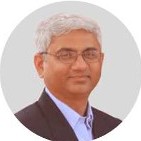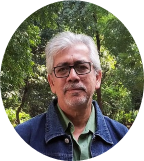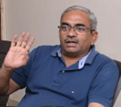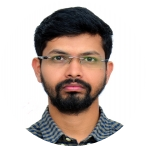Recent Trends: Sensing in Agriculture
Precision farming is the need of the time to address food security for the region, nation and world as a whole. Different sensors are the most critical and integral part of precision irrigation, nutrient-management and crop health monitoring.
In addition to precision-irrigation and nutrient-management, early disease detection is another critical area for farmers, since most farmers do not have deep know-how to effectively detect and manage them most efficiently, resulting more often either over-treatment or under-treatment or too late treatment.
Data driven decision making for improving quality and quantity of yield would most likely get best results in this multi-variable problem, where few of the variables are very hard to control if not impossible.
Date and Time
Location
Hosts
Registration
-
 Add Event to Calendar
Add Event to Calendar
- Contact Event Host
-
Prof. Vinay Palaparthy, vinay_shrinivas@daiict.ac.in
- Co-sponsored by IEEE Sensors Council
Speakers
 Vinay of Proximal Soilsens Tech
Vinay of Proximal Soilsens Tech
In-field sensors for precise irrigation
A talk on the sensor technology from lab to field: Its Challenges and how to mitigate. His talk will also give overview on business model for the Agri-start-ups.
Biography:
Prof. Vinay Palaparthy received the M.Sc. (Hons.) degree from Nagpur University, Nagpur, India, in 2011, and the Ph.D. degree from the Indian Institute of Technology Bombay, Mumbai, India, in 2018. He is currently working in the field of Microelectromechanical system MEMS)/Nanoelectromechanical system (NEMS) sensor design, 2-D nanomaterials and embedded system design primarily focusing on the in-situ agriculture applications. He is currently working as an Assistant Professor with the DAIICT, Gandhinagar, India. He has 25 research publications and two Indian patent awarded on his ongoing work. Dr. Palaparthy was awarded Inspire Fellowship for his Ph.D. degree from the Department of Science and Technology (DST). He has one best paper award in an international journal. He was a co-recipient of the Millennium Alliance Award for the startup name Proximal Soilsens Technologies Pvt., Ltd., where he is one of co-founder.
Email:
Address:Gandhinagar, India
 Anup of Insignex
Anup of Insignex
Challenges of Agriculture Automation - Indian context:
In India, we have more cultivated and arable land than any other country. But we have very poor production per hector and so is agriculture GDP. Even though production in agriculture depends on many different parameters, where some are – e.g. weather; beyond anyone's control. We can improve production by more disciplined and data driven decisions by various degree of automation.
There are variety of challenges farmers have in adopting different degree of automation. They range from know-how for selecting system, initial cost, maintenance or ongoing-cost, down-time, malfunctioning systems and most importantly in Indian context small size operating land holding. Even system-design-side has many challenges ranging from need for high-degree customization, harsh operating conditions, untrained users and maintainers. Building systems which addresses above challenges with less than 4 years of RoI is difficult problem to solve.
Biography:
Anup Shah, founder of InSignEx is alumnus of IISc Bangalore and BVM V.V.Nagar, Anand. He worked at Tata Elxsi, Bangalore, India, followed by Magnum Semiconductor Inc, Fremont, USA as Principal Engineer focusing on multi-processor hardware accelerators, video-quality and SoC resource allocation. His area of expertise includes building scalable embedded software of large software for long term stability. At InSignEx, his team has developed complete solution for smart-farming e.g. mobile based agriculture irrigation, fertigation automation, green-house climate control system, with focus to Indian context
Email:
Address:Anand, India
 Ranendu of DA-IICT, Gandhinagar
Ranendu of DA-IICT, Gandhinagar
Heavy metal detection using Image methods
A talk on detection of the heavy metals in the soil using image based methods.
Biography:
Dr. Ranendu Ghosh has completed his post graduation and Ph.D. from Indian Agricultural Research Institute (IARI), New Delhi in Soil Chemistry and Plant Nutrition. After finishing his degree from IARI, he joined SAC, ISRO, Ahmedabad as scientist. During his stay at SAC (ISRO) he contributed in various national missions for the application of satellite remote sensing and communication technology for the development and planning of natural resources in the country. He has taken voluntary retirement from SAC, ISRO and joined as a full time faculty at DA-IICT in 2010. Some of the major projects he participated are Village Resources Center (VRC), National Resources Information System (NRIS), and Integrated Mission for Sustainable Development (IMSD). As part of VRC project Dr. Ghosh coordinated the activities of designing and implementing 11 student and 4 master nodes in the villages of Kutch, Ahmedabad, Surendranagar for tele-medicine, tele-education. In recognition to his contribution for developing a tele medicine center at Sabarmati jail and connecting with Apollo hospital, Dr.Ghosh and Gujarat Police, was jointly conferred with Manthan Award South Asia 2009 by Digital Empowerment Foundation, New Delhi. Dr. Ghosh is also recipient of prestigious ISRO Team Excellence Award and Best Teacher Award, DA-IICT in 2012 and 2015 respectively. Dr. Ghosh has published number of scientific papers in national and international journals of repute.
Email:
Address:DA-IICT, Near Indroda Circle, , Gandhinagar, India, 382007
 Yogesh of Director, ACT, Bhuj
Yogesh of Director, ACT, Bhuj
Arid Communities and Technologies
Arid Communities and Technologies is a professional voluntary organization (PVO) based at Bhuj. activities. ACT is on mission to strengthening livelihoods of communities in arid and semi-arid regions by resolving ecological constraints through, provision or facilitation of access to technologies, or engender technological and institutional solutions in collaboration with communities. Experiences and results achieved thus far discussed in this talk.
Biography:
Dr. Yogesh Jadeja received the M.Sc. degree from M. S. University of Baroda, in 1993, Post Graduate Diploma in Ecology and Environment in 1999 and the Ph.D. degree from the M. S. University of Baroda, India in 2005 From September 1993 to February 2004 he worked with Sahjeevan (formerly known as Jan Vikas Ecology Cell), Bhuj, a voluntary organization working on the eco-restoration and development aspects of the Kachchh region of Gujarat State. It emphasizes on empowering the rural communities to make choices for development through an active process of organizing and lobbying. It supports its activities by research and development studies to generate sustainable livelihoods. Currently He is working with Arid Communities and Technologies (ACT-Bhuj) as Director, from March 2004. ACT is a professional voluntary organization (PVO) based at Bhuj with a mission to strengthening livelihoods of communities in arid and semi-arid regions by resolving ecological constraints through, provision or facilitation of access to technologies, or engender technological and institutional solutions in collaboration with communities. It is important to mention that He was the main founder member of this institute.
Address:Bhuj, India
 Hitesh of NIT Warangal
Hitesh of NIT Warangal
Nanomaterials for Agri-sensors
A talk on Nanomaterials for Agri-sensors. It encomapsses how to build nano-material, characterise them, test them for reliability and repeatability. Subsequently it touches how to make N, P, K sensors from similar processes with subtle changes.
Biography:
Prof. Hitesh Borkar is currently working as the assistant professor at National Institute of Technology, Warangal, India and associated with the department of chemistry. His research work includes Electronic, energy, and magnetic materials for energy storage and harvesting, Functional materials, 2D materials for electronic devices, Material characterizations, Ferroelectric materials for non-volatile memory applications, Transparent photovoltaic devices, ferro-photovoltaic materials, opto-electronics, Lead-free piezoelectric sensors and actuators, Electrocaloric effect and its phenomenon in polar electroceramic materials. He has more than 30 research articles in the field of Nanomaterials and nanotechnology
Address:Hyderabad, India
Agenda
Detail schedule:
0930 to 1000 Inaugural session - Prof. Sanjay Srivastava
1000 to 1100 In-field sensors for precise irrigation - Dr. Vinay Palaparthy
1100 to 1200 Arid Communities and Technologies- Dr. Yogesh Jadeja
1200 to 1300 Heavy metal detection using Image methods - Dr. Ranendu Ghosh
1300 to 1400 Lunch
1400 to 1500 Nanomaterials for Agri-sensors - Dr. Hitesh Borkar
1500 to 1600 Challenges in automation - Mr Anup Shah
1600 to 1700 Product and prototype Demonstration
1700 to 1715 Valedictory Session

